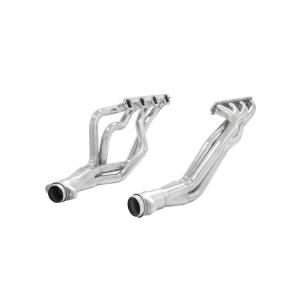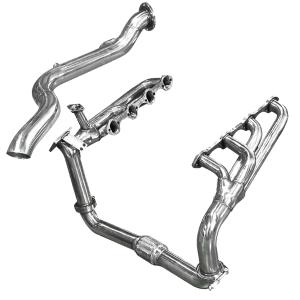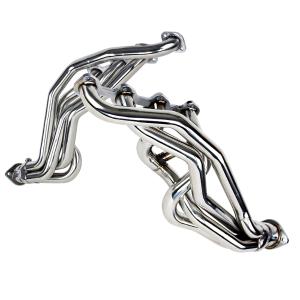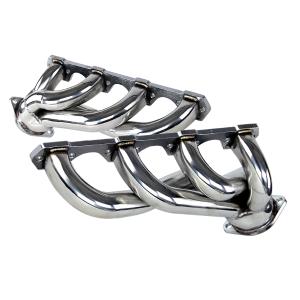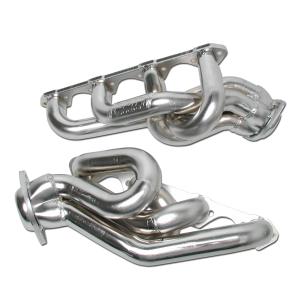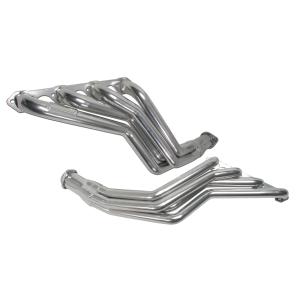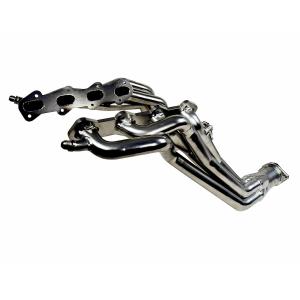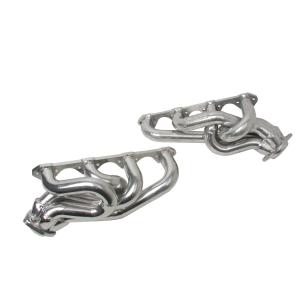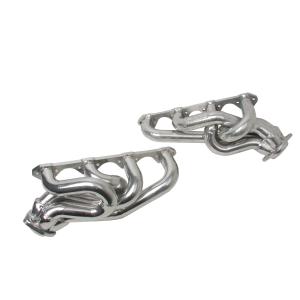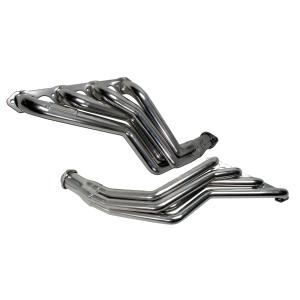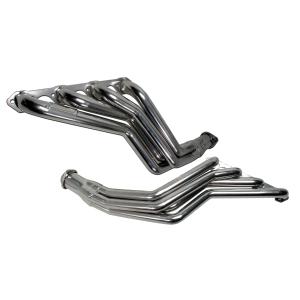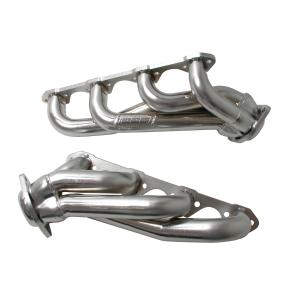Hello, Sign In!
Ford Mustang Headers
At Andy's Auto Sport, we have a huge variety of Ford Mustang headers to ensure that you have every header option available to you. We go out of our way to carry every major line of Ford Mustang headers, so that whether you are looking for long tube Ford Mustang headers or custom exhaust headers or anything in between, we've got it for you. Andy's Auto Sport is the ultimate shopping destination for your Ford Mustang header needs!
Select Your Vehicle
Shop Ford Mustang Headers by Year
Shop Ford Mustang Headers by Brand
1 - 12 of 125
Sort by:
Fits: 64-73 Ford Mustang V6 (shorty headers)
PART# 814211
Tube Grouping: 4-1
Finish: Stainless Steel
Fits: 79-95 FORD MUSTANG 5.0 V8 TURBO MANIFOLD
PART# TM-K-MST79V8
Tube Grouping: 4-1
Finish: Stainless Steel
Finish: Chrome
Header Style: Equal Length
Fits: 94-95 Ford Mustang Manual Transmission
PART# 15190
Finish: Ceramic Coated - Stainless Steel
Header Style: Long Tube
Fits: 96-98 Ford Mustang Cobra, 96-04 Ford Mustang GT Manual Transmission, 99-04 Ford Mustang Cobra, 96-04 Ford Mustang GT Manual Transmission
PART# 1532
Finish: Chrome
Header Style: Long Tube
Finish: Ceramic Coated - Stainless Steel
Header Style: Equal Length
Finish: Ceramic Coated - Stainless Steel
Header Style: Equal Length
Fits: 94-95 Ford Mustang Manual Transmission
PART# 1519
Finish: Chrome
Header Style: Long Tube
Fits: 79-93 Ford Mustang Manual Transmission
PART# 1516
Finish: Chrome
Header Style: Long Tube
Finish: Chrome
Header Style: Shorty
When you click on links to various merchants on this site and make a purchase, this can result in this site earning a commission. Affiliate programs and affiliations include, but are not limited to, the eBay Partner Network.
Not able to find what you are looking for?


Stainless Steel Manifold Headers for 2011-2016 Ford Mustang GT 5.0L V8 NEW

Exhaust Manifold Headers Stainless Fits 1979-1993 Ford Mustang 5.0L V8 Engines

Stainless Exhaust Manifold Headers Kit for 2011-2016 Ford Mustang GT 5.0L V8 New

For Fox Body LS Conversion Swap Headers 79-93 & 94-04 Ford Mustang 4.8L 5.3L

Stainless Steel Headers Shorty For Ford 260 289 302 Mustang 302CU 5.0 1964-1977

1Pair Exhaust Manifold Headers For 96-04 Ford Mustang Gt 4.6L V8 Stainless Steel
DID YOU KNOW?
Ford Mustang Header is the term used to describe the aftermarket product that replaces the factory exhaust manifold. Headers are normally designed to be less restrictive than the factory exhaust manifolds that they replace, thereby generating more horsepower.
Headers are considered part of the exhaust system of the vehicle. Right after the incoming air and fuel combust, the result exhaust is push through the headers and out the exhaust. The headers are often connected to the catalytic converter, which is connected to the muffler and exhaust tip, so the headers are the "front" of the exhaust system.
Some of the popular brands of headers that you'll find are: DC Sports, Hedman, Hooker, Doug Thorley, Pacesetter, and Flowtech, among others.
We get asked a lot if you can buy Ford Mustang headers but still leave the stock catalytic converter in place. The answer is yes in almost every case, as the Ford Mustang headers are still designed with flanges in most cases that will mount right up to the existing factory parts.
Headers are considered part of the exhaust system of the vehicle. Right after the incoming air and fuel combust, the result exhaust is push through the headers and out the exhaust. The headers are often connected to the catalytic converter, which is connected to the muffler and exhaust tip, so the headers are the "front" of the exhaust system.
Some of the popular brands of headers that you'll find are: DC Sports, Hedman, Hooker, Doug Thorley, Pacesetter, and Flowtech, among others.
We get asked a lot if you can buy Ford Mustang headers but still leave the stock catalytic converter in place. The answer is yes in almost every case, as the Ford Mustang headers are still designed with flanges in most cases that will mount right up to the existing factory parts.
FAQs
Q: What are the different tubing options for headers and what is the difference between them?
A: There are two major designs for headers: the 4-2-1 design and the 4-1 design. In many cases 4-1 headers are designed for racing applications where the vehicle is being driven at or near redline. The 4-1 design maximizes top end power, whereas the 4-2-1 evenly distributes it throughout the power band. Either way, you're going to be getting more horsepower from a header.
Q: What does a header do? Why buy a header?
A: An exhaust header is a performance product that replaces your factory exhaust manifold and improves an engine's performance by allowing air to flow more freely. The easier an engine breathes the more power it produces. Headers generally use piping with a wider diameter than factory tubing, which allows more air to pass through the exhaust system than factory. A header is one of the easiest bolt-on modifications you can make to increase horsepower, making an effective use of money if your goal is to quickly gain horsepower.
Q: How do you install a header?
A: A header is a direct bolt-on. Simply remove the factory OEM exhaust manifold and the aftermarket header is put in its place. The header is to be attached the head of your vehicle. Remove all the bolts that hold the flanges in place and detach the factory manifold. The down pipe or exhaust pipe should be removed as well and then reattached once the header flanges are bolted back onto the head.
Q: For which vehicles is it necessary to buy a pair of headers? On your website are headers automatically sold in pairs for these vehicles?
A: When purchasing exhaust headers for a V-6 or V-8 engine, the header package is complete with two headers. If your vehicle is a 4-cylinder, there only a single header that is used.
Q: How much does the material used to make the header matter?
A: There are two main materials that headers are manufactured out of: ceramic and stainless steel. Ceramic headers are less expensive, but are prone to cracking if they get to be extremely hot. Stainless steel headers are more expensive but are more durable and generally more stylish. Stainless steel headers can take any kind of heat you throw at it and not prone to cracking.
A: There are two major designs for headers: the 4-2-1 design and the 4-1 design. In many cases 4-1 headers are designed for racing applications where the vehicle is being driven at or near redline. The 4-1 design maximizes top end power, whereas the 4-2-1 evenly distributes it throughout the power band. Either way, you're going to be getting more horsepower from a header.
Q: What does a header do? Why buy a header?
A: An exhaust header is a performance product that replaces your factory exhaust manifold and improves an engine's performance by allowing air to flow more freely. The easier an engine breathes the more power it produces. Headers generally use piping with a wider diameter than factory tubing, which allows more air to pass through the exhaust system than factory. A header is one of the easiest bolt-on modifications you can make to increase horsepower, making an effective use of money if your goal is to quickly gain horsepower.
Q: How do you install a header?
A: A header is a direct bolt-on. Simply remove the factory OEM exhaust manifold and the aftermarket header is put in its place. The header is to be attached the head of your vehicle. Remove all the bolts that hold the flanges in place and detach the factory manifold. The down pipe or exhaust pipe should be removed as well and then reattached once the header flanges are bolted back onto the head.
Q: For which vehicles is it necessary to buy a pair of headers? On your website are headers automatically sold in pairs for these vehicles?
A: When purchasing exhaust headers for a V-6 or V-8 engine, the header package is complete with two headers. If your vehicle is a 4-cylinder, there only a single header that is used.
Q: How much does the material used to make the header matter?
A: There are two main materials that headers are manufactured out of: ceramic and stainless steel. Ceramic headers are less expensive, but are prone to cracking if they get to be extremely hot. Stainless steel headers are more expensive but are more durable and generally more stylish. Stainless steel headers can take any kind of heat you throw at it and not prone to cracking.
Filter Your Results
Category 

-
Headers(125)
Brand 

-

-

-

-

-

-

-

-

-
See More Brands...
Header Style 

Popular Categories
Mustang Parts
Mustang Catalytic Converters
Mustang Mufflers
Mustang Muffler Tips
Mustang Crossover Pipes
Mustang Resonators
Mustang Exhaust Systems
Mustang Rims
Mustang Cold Air Intakes
Mustang Headlights
Mustang Tail Lights
Mustang Body Kits
Mustang Headers
Mustang Hoods
Mustang Struts and Shocks
Mustang Racing Seats
Mustang Carbon Fiber Hoods
Performance Sitemap
Mustang Catalytic Converters
Mustang Mufflers
Mustang Muffler Tips
Mustang Crossover Pipes
Mustang Resonators
Mustang Exhaust Systems
Mustang Rims
Mustang Cold Air Intakes
Mustang Headlights
Mustang Tail Lights
Mustang Body Kits
Mustang Headers
Mustang Hoods
Mustang Struts and Shocks
Mustang Racing Seats
Mustang Carbon Fiber Hoods
Performance Sitemap
Ford Mustang Headers
At Andy's Auto Sport, we have a huge variety of Ford Mustang headers to ensure that you have every header option available to you. We go out of our way to carry every major line of Ford Mustang headers, so that whether you are looking for long tube Ford Mustang headers or custom exhaust headers or anything in between, we've got it for you. Andy's Auto Sport is the ultimate shopping destination for your Ford Mustang header needs!
Choose Your Vehicle:
Shop Ford Mustang Headers by Year
Shop Ford Mustang Headers by Brand
1 - 12 of 125
Sort by:
Fits: 64-73 Ford Mustang V6 (shorty headers)
PART# 814211
Tube Grouping: 4-1
Finish: Stainless Steel
Fits: 79-95 FORD MUSTANG 5.0 V8 TURBO MANIFOLD
PART# TM-K-MST79V8
Tube Grouping: 4-1
Finish: Stainless Steel
Finish: Chrome
Header Style: Equal Length
Fits: 94-95 Ford Mustang Manual Transmission
PART# 15190
Finish: Ceramic Coated - Stainless Steel
Header Style: Long Tube
Fits: 96-98 Ford Mustang Cobra, 96-04 Ford Mustang GT Manual Transmission, 99-04 Ford Mustang Cobra, 96-04 Ford Mustang GT Manual Transmission
PART# 1532
Finish: Chrome
Header Style: Long Tube
Finish: Ceramic Coated - Stainless Steel
Header Style: Equal Length
Finish: Ceramic Coated - Stainless Steel
Header Style: Equal Length
Fits: 94-95 Ford Mustang Manual Transmission
PART# 1519
Finish: Chrome
Header Style: Long Tube
Fits: 79-93 Ford Mustang Manual Transmission
PART# 1516
Finish: Chrome
Header Style: Long Tube
Finish: Chrome
Header Style: Shorty
When you click on links to various merchants on this site and make a purchase, this can result in this site earning a commission. Affiliate programs and affiliations include, but are not limited to, the eBay Partner Network.
Not able to find what you are looking for?


Stainless Steel Manifold Headers for 2011-2016 Ford Mustang GT 5.0L V8 NEW

Exhaust Manifold Headers Stainless Fits 1979-1993 Ford Mustang 5.0L V8 Engines

Stainless Exhaust Manifold Headers Kit for 2011-2016 Ford Mustang GT 5.0L V8 New

For Fox Body LS Conversion Swap Headers 79-93 & 94-04 Ford Mustang 4.8L 5.3L

Stainless Steel Headers Shorty For Ford 260 289 302 Mustang 302CU 5.0 1964-1977

1Pair Exhaust Manifold Headers For 96-04 Ford Mustang Gt 4.6L V8 Stainless Steel
DID YOU KNOW?
Ford Mustang Header is the term used to describe the aftermarket product that replaces the factory exhaust manifold. Headers are normally designed to be less restrictive than the factory exhaust manifolds that they replace, thereby generating more horsepower.
Headers are considered part of the exhaust system of the vehicle. Right after the incoming air and fuel combust, the result exhaust is push through the headers and out the exhaust. The headers are often connected to the catalytic converter, which is connected to the muffler and exhaust tip, so the headers are the "front" of the exhaust system.
Some of the popular brands of headers that you'll find are: DC Sports, Hedman, Hooker, Doug Thorley, Pacesetter, and Flowtech, among others.
We get asked a lot if you can buy Ford Mustang headers but still leave the stock catalytic converter in place. The answer is yes in almost every case, as the Ford Mustang headers are still designed with flanges in most cases that will mount right up to the existing factory parts.
Headers are considered part of the exhaust system of the vehicle. Right after the incoming air and fuel combust, the result exhaust is push through the headers and out the exhaust. The headers are often connected to the catalytic converter, which is connected to the muffler and exhaust tip, so the headers are the "front" of the exhaust system.
Some of the popular brands of headers that you'll find are: DC Sports, Hedman, Hooker, Doug Thorley, Pacesetter, and Flowtech, among others.
We get asked a lot if you can buy Ford Mustang headers but still leave the stock catalytic converter in place. The answer is yes in almost every case, as the Ford Mustang headers are still designed with flanges in most cases that will mount right up to the existing factory parts.
FAQs
Q: What are the different tubing options for headers and what is the difference between them?
A: There are two major designs for headers: the 4-2-1 design and the 4-1 design. In many cases 4-1 headers are designed for racing applications where the vehicle is being driven at or near redline. The 4-1 design maximizes top end power, whereas the 4-2-1 evenly distributes it throughout the power band. Either way, you're going to be getting more horsepower from a header.
Q: What does a header do? Why buy a header?
A: An exhaust header is a performance product that replaces your factory exhaust manifold and improves an engine's performance by allowing air to flow more freely. The easier an engine breathes the more power it produces. Headers generally use piping with a wider diameter than factory tubing, which allows more air to pass through the exhaust system than factory. A header is one of the easiest bolt-on modifications you can make to increase horsepower, making an effective use of money if your goal is to quickly gain horsepower.
Q: How do you install a header?
A: A header is a direct bolt-on. Simply remove the factory OEM exhaust manifold and the aftermarket header is put in its place. The header is to be attached the head of your vehicle. Remove all the bolts that hold the flanges in place and detach the factory manifold. The down pipe or exhaust pipe should be removed as well and then reattached once the header flanges are bolted back onto the head.
Q: For which vehicles is it necessary to buy a pair of headers? On your website are headers automatically sold in pairs for these vehicles?
A: When purchasing exhaust headers for a V-6 or V-8 engine, the header package is complete with two headers. If your vehicle is a 4-cylinder, there only a single header that is used.
Q: How much does the material used to make the header matter?
A: There are two main materials that headers are manufactured out of: ceramic and stainless steel. Ceramic headers are less expensive, but are prone to cracking if they get to be extremely hot. Stainless steel headers are more expensive but are more durable and generally more stylish. Stainless steel headers can take any kind of heat you throw at it and not prone to cracking.
A: There are two major designs for headers: the 4-2-1 design and the 4-1 design. In many cases 4-1 headers are designed for racing applications where the vehicle is being driven at or near redline. The 4-1 design maximizes top end power, whereas the 4-2-1 evenly distributes it throughout the power band. Either way, you're going to be getting more horsepower from a header.
Q: What does a header do? Why buy a header?
A: An exhaust header is a performance product that replaces your factory exhaust manifold and improves an engine's performance by allowing air to flow more freely. The easier an engine breathes the more power it produces. Headers generally use piping with a wider diameter than factory tubing, which allows more air to pass through the exhaust system than factory. A header is one of the easiest bolt-on modifications you can make to increase horsepower, making an effective use of money if your goal is to quickly gain horsepower.
Q: How do you install a header?
A: A header is a direct bolt-on. Simply remove the factory OEM exhaust manifold and the aftermarket header is put in its place. The header is to be attached the head of your vehicle. Remove all the bolts that hold the flanges in place and detach the factory manifold. The down pipe or exhaust pipe should be removed as well and then reattached once the header flanges are bolted back onto the head.
Q: For which vehicles is it necessary to buy a pair of headers? On your website are headers automatically sold in pairs for these vehicles?
A: When purchasing exhaust headers for a V-6 or V-8 engine, the header package is complete with two headers. If your vehicle is a 4-cylinder, there only a single header that is used.
Q: How much does the material used to make the header matter?
A: There are two main materials that headers are manufactured out of: ceramic and stainless steel. Ceramic headers are less expensive, but are prone to cracking if they get to be extremely hot. Stainless steel headers are more expensive but are more durable and generally more stylish. Stainless steel headers can take any kind of heat you throw at it and not prone to cracking.
VIDEOS RELATED TO FORD MUSTANG HEADERS
VIDEOS RELATED TO FORD MUSTANG HEADERS
-
Video Description:Headers on Andy's Auto Sport TV!
Check out this episode of Andy's Auto Sport TV where we explain all the basics about headers. In the video, we explain why headers open up horsepower gains and explain the difference between different types of headers, such as stainless steel headers, ceramic headers, painted headers, and chrome headers. Featured brands of headers in the video include DC Sports headers, Gibson headers, and Doug Thorley headers. We also show how to install headers and then show the resulting horsepower gains with our dyno run results!
Popular Categories
Mustang Parts
Mustang Catalytic Converters
Mustang Mufflers
Mustang Muffler Tips
Mustang Crossover Pipes
Mustang Resonators
Mustang Exhaust Systems
Mustang Rims
Mustang Cold Air Intakes
Mustang Headlights
Mustang Tail Lights
Mustang Body Kits
Mustang Headers
Mustang Hoods
Mustang Struts and Shocks
Mustang Racing Seats
Mustang Carbon Fiber Hoods
Performance Sitemap
Mustang Catalytic Converters
Mustang Mufflers
Mustang Muffler Tips
Mustang Crossover Pipes
Mustang Resonators
Mustang Exhaust Systems
Mustang Rims
Mustang Cold Air Intakes
Mustang Headlights
Mustang Tail Lights
Mustang Body Kits
Mustang Headers
Mustang Hoods
Mustang Struts and Shocks
Mustang Racing Seats
Mustang Carbon Fiber Hoods
Performance Sitemap




